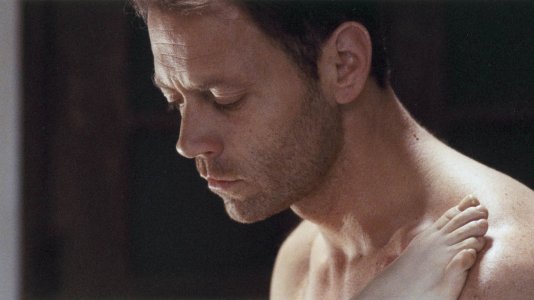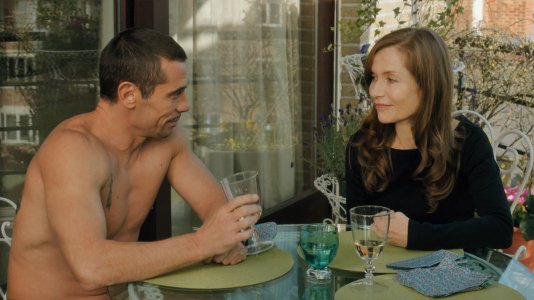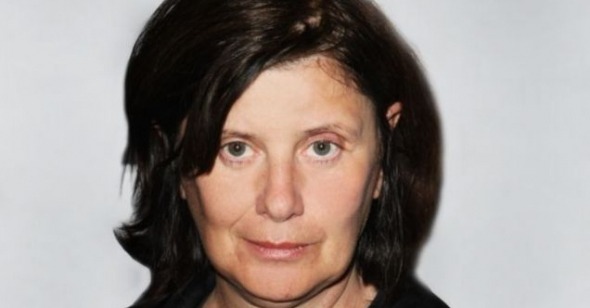Filming the Impossible:
An Interview with Catherine Breillat
by Nicole Richter
I had the pleasure of interviewing Catherine Breillat at the Wexner Center for the Arts as she prepared to introduce her most recent film, Abuse of Weakness. Starring Isabelle Huppert, the film is based on her personal experiences after suffering a major stroke in 2004. The film was shown as part of a retrospective of her work, and I took this as inspiration to discuss her filmmaking career as a whole. Montreal-based translator Robert Gray was present to facilitate the conversation.
Reverse Shot: I want to start with Anatomy of Hell, which I think is the most fearless and courageous film of the last two decades. Why did you want to make Anatomy of Hell?
Catherine Breillat: That’s the greatest for me too; that’s my favorite film. The film is perfect.
I actually wanted to adapt a novel by Marguerite Duras and I wasn't able to get the rights. I was absolutely furious and I thought "I can write it myself" and I sat down to write it one summer. In fact, I was writing two scripts at the same time. The very same day I'd be writing another script, Sex Is Comedy, and then sit down to write Anatomy of Hell. There was a beauty of language I had lost. I started out writing a novel, and in the meantime of writing scripts and doing other things I had lost that mastery of language, but it came back in writing this film. There was a violence I felt in writing the film. I couldn't stop writing it. I was absolutely taken by it; possessed by it.
I wanted to make Romance again. I wanted to do it over. I felt that Romance after I finished was too icy. I wanted to do something more violent so I sat down to do this. Although it is very stripped down and very pure in itself, it is nonetheless more violent and went further in that direction than Romance did. I took sections from the book [Pornocratie] and cut them in and put them in the script. There were parts that were extremely violent and I realized they were impossible to film. I never read my scripts after I have written them. In fact the scripts are just a starting point. I give them to my assistant so he can prepare a shooting schedule. I looked at the script before we started shooting and I read it and said, "Shit, what have I gotten myself into?" I was absolutely terrified. I didn't dare look at people. I really thought that it was impossible. There is no way I can make this film. I wouldn't look at people in the eyes. I was looking down at my shoes the whole time.
RS: How did you overcome that to shoot the film?
Breillat: Well, one of the things was to look at the settings. I had decided on the set myself, so I went into the studio and looked at what was done and I was very upset. I didn't like what I was seeing. The fact that I was angry brought me out of myself. It allowed me to externalize my feelings. The next day I arrived on set and felt that I was absolutely committed to doing it and absolutely had the courage to do it. I told my DP Giorgos [Arvanitis] to think of the film as being German Expressionist, to imagine it was in black and white although we were going to shoot in color, and as a silent film even though there would be lots of dialogue.
It's a film in which I did everything. I controlled everything. I did the sets, I did the costumes, I did the accessories, even a lot of the special effects. The film belongs to me to a degree that no other film does. The choice of Rocco [Siffredi] as the actor, for example. He is an extraordinary actor and people don't understand that even after this film. When Giorgos heard I was casting Rocco he wanted to back out of the project and afterward he agreed that Rocco was extraordinary. He acts with precision. There is an elegance in the way he moves that is just extraordinary. He is able to say lines I thought were impossible—for example, the line at least frogs have the decency to be green. In fact my crew told me there is no point in trying to shoot it, there is no actor who can say that but Rocco managed to come through with it. When I looked at Rocco in the eye, then I felt that I was looking into my sister's eye. There was this loss of identity and a transcendence in that identification. Who is looking at whom? Whose gaze am I incorporating here? I never felt myself transposed as much into a body of a man as I did with Rocco.

RS: The film sparked a lot of controversy because of the content. How did you approach the scene where Amira offers menstrual tea to Rocco?
Breillat: The film did arouse hatred in certain people [various religious groups]. They didn't like the fact that I was dealing for example with menstruation. The scene in which Amira drinks is magnificently poetic; it’s the sort of thing you can't plan ahead of time. You don't know how you’re going to do it. In fact, I thought there is no way I can do it, it can’t be filmed, but she is wonderful in the scene. It is beautiful when she takes the glass; this power of poetry is there. As a filmmaker it's a gift, it’s not something you can decide how to film ahead of time. You can simply be there to film it and hope it arises.
RS: It’s a very spiritual moment. One of the things that I love about your films is that they reunite sex and sexuality with a spiritual realm.
Breillat: That's my permanent theme, and something I am always dealing with. It is beauty and the beast. Rocco is like King Kong when he holds Fay Wray in the palm of his hand. He could crush her but she fascinates him and she makes a man of him. He becomes a man through her. Although he is the stronger of the two he allows himself to become weaker. He acquires humanity not by being a beast but by being weaker rather than stronger. Everyone thought the film was about men who hate women, but for me it was a metaphor. It was that all men hate women especially men that love women—they hate them even more. For me there is a Messianic element here. He only acquires his humanity through her, because of her. In fact in the shot she takes a Christ-like pose and there is a crucifix above her. She brings this humanity to him; she reveals the truth to him. He receives the revelation but it is she who reveals it to him. Through her revelation he acquires his humanity and acquires this knowledge.
It is difficult because on the one hand, if only one person gets what you are trying to do that's enough; you can be satisfied. At the same time, because cinema is so expensive, then it’s better still if more than one person got it. Some people misunderstood the film, but on the other hand a lot of people really got it.
RS: Do you still enjoy watching your very earliest films like Une vraie jeune fille? Do you feel connected to them or are they in the past for you?
Breillat: On the contrary, it’s an object from the future although it is archaic. I didn’t see that film until 25 years after I'd made it. I saw it for the first time to do a color correction to check the print. I saw it in a screening room that was filled with Asian buyers and I was amazed. I thought to myself "I did this!" because the film was so ultra modern, but it was archaic and old fashioned at the same time. I think the film was even more violent than Romance, particularly the scene with her legs spread with the worm. [Hiram] Keller was an actor I had seen in Satyricon. Keller for me is the standard of beauty; he is the criteria of beauty.
Again it seemed like one of these impossible projects. How do I film it? Visually, the approach is one of hyperrealism, the opposite of what was being done in France at the time. The colors were extremely bright, whereas in France people were using blue and beige, very subdued and very tasteful colors. My colors were the colors of medieval paintings or American hyperrealism. Again this was a film that I did everything on. I designed the costumes, sewed the costumes, and chose the fabrics. I even did the Fresco in the kitchen and I did the hair. For the scene with the grass, I thought the grass was too green so I yellowed it myself. I shot the film in an area where I had spent my childhood. In the scene with the barbed wire there is a field that is parallel to the sea, and that is something that is there. The dead dog that you see is a dead dog I saw on the road and brought into my car and let rot. When we had to go from the house to the sea to shoot the scene we had to transport the dog. The odor of the rotting flesh was magnificent, but of course absolutely unbearable. The smell was atrocious, but it was something that obsessed you and stayed with you for days. We were terrified as we drove through towns and by cops—I thought if they stop us they will be convinced we are transporting a body. Also, the scene with the chicken, I look back at it now and think how could I do that? How is it possible that you can shoot that? But this is what I did and this is what I always do: put myself in the position where I have to shoot these impossible scenes. When I watched it 25 years later I thought it was a very young film and unlike any film that had ever been made.
RS: You have been making films for over 45 years now. How have you changed as a filmmaker after all these years? How have you changed as a person?
Breillat: To be honest I don't think I've changed that much. It’s true that I am perhaps less direct now than I was when I made Une vrai jeune fille, but I still seek to write things that are impossible to shoot. I write them and I arrive on set and I have to do this scene and I don’t know how. I force myself into a position where I have to do the impossible. It allows me to come up with things that no one has ever done before. It’s rather the things that are everyday, the things that are banal, that are expected, that are ordinary that I find much more difficult and I think I am not as good at. It is the scenes where you don't know what to do where you surprise yourself. And you ask yourself why certain scenes are impossible to shoot. It turns out they are for very banal and prosaic reasons—for reasons of our upbringing and middle-class morality. Suddenly then what seems impossible to shoot, it gives you wings—it is a poetic force that carries you along that makes you better than you are and brings you to new heights. That is why I am always writing these scenes for myself, it is there in these impossible scenes that I discover that I am an artist and that I am doing things that haven't been done before that other people can’t do.

RS: Was this true in your latest film Abuse of Weakness since it is so personal?
Breillat: There weren't enough scenes that were impossible to do. The ending was impossible, but the rest was perhaps too simple. People think it was impossible for me to shoot it because it was my own story, but I don't care about that. I have transformed this into artistic material, I have no inhibitions whatsoever, no sense of false modesty in dealing with that material on camera.
RS: Are you working on something now?
Breillat: The film that I really want to make will be impossible for me to obtain financing for. I think I will have to come back to it and present it in a different guise because the way it is on paper no one would accept to produce it or invest in it.
RS: Why?
Breillat: The problem with the script is because when people read a script they think of it in terms of realism or in terms of sociology. What I am dealing with is morally unacceptable. It deals with rape on a level you can't approach sociologically. It is about poetry—my films are in the realm of poetry not sociology. I always say my films aren't about realism they are about truth—there is a poetry that transcends the concrete, the plastic superficial level. I am fascinated by corpses, I am fascinated by violence.
RS: Do you feel in contemporary society that shame surrounding the female body has lessened? Is the woman's body more accepted in cinema?
Breillat: It’s worse and worse in France today. We are going backward; it is totally retrograde. If you look at young girls there are many that are wearing head scarves and veils. When I was growing up I never saw that, not a single time and now it seems to be normal; it is accepted. No, it’s not normal; it’s not acceptable. It’s the return of the sense of obscenity, but obscenity is in the gaze of course. It is the obscenity in looking at the woman's body. It is the gaze that makes things obscene. It is absolutely horrible; it is twisted. Women cannot be seen or looked at. This is something I find abominable.
Always in this insanity of religion, people are killed or tortured. Men are killed or tortured too, but women are stripped naked when they are punished. It is the same fear of obscenity and the women's body. It is absolutely perverse.
RS: And people say you make perverse films!
Breillat: I know I say things I shouldn't say. I say things that shouldn't be said and I love doing it. You can also say that I am a pedophile because I am madly in love with filming young girls; I am a necrophile because I adore shooting death. But it is the beauty that fascinates me, not the perversity of it. This is the artistic material I like working with. Every artist has material. It is not the perversity per se but the beauty of it that inspires me.
